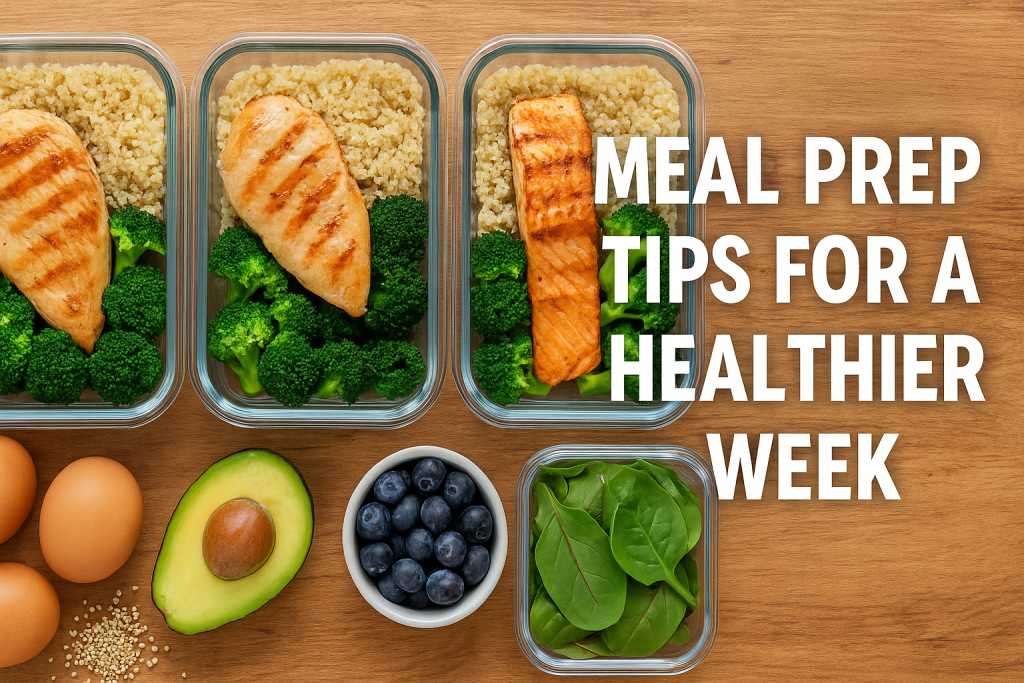
Why Meal Prep Matters
In today’s fast-paced world, finding the time to cook healthy meals every day can be a real challenge. That’s where meal prep comes in. By preparing meals in advance, you can save time, reduce stress, and ensure that you’re eating nutritious, balanced meals throughout the week. Whether you’re trying to lose weight, eat cleaner, or just get more organized, meal prep is a game-changer.
1. Set Your Goals First
Before you start chopping vegetables or cooking rice, determine what you want to achieve with your meal prep. Are you trying to:
- Lose weight?
- Save money?
- Eat more vegetables?
- Avoid takeout?
Having a clear goal will help you plan the right kinds of meals and stay motivated throughout the week.
2. Choose a Prep Day and Stick to It
Pick a day of the week when you have a few hours to dedicate to meal prepping—most people choose Sunday or Monday. Treat it like an important appointment with yourself. Consistency is key to building the habit.
Bonus Tip:
Use that time to listen to your favorite music or podcast to make meal prep more enjoyable.
3. Plan Your Menu for the Week
Planning ahead is the backbone of successful meal prep. Here’s how:
- Decide how many meals you need for the week (e.g., lunches for 5 days).
- Choose recipes that are easy to cook in bulk.
- Opt for dishes that store well in the fridge or freezer.
- Include a variety of proteins, veggies, and grains to avoid boredom.
Sample Weekly Menu:
- Monday: Grilled chicken + quinoa + roasted veggies
- Tuesday: Turkey chili + brown rice
- Wednesday: Lentil soup + side salad
- Thursday: Stir-fried tofu + broccoli + jasmine rice
- Friday: Salmon + sweet potato + green beans
4. Keep It Simple
One of the biggest mistakes beginners make is trying to prep too many complicated meals. Stick to 2–3 main dishes and rotate them throughout the week. Not only does this save time, but it also cuts down on grocery costs and food waste.
Ideas for Simple Base Ingredients:
- Protein: Chicken, turkey, tofu, boiled eggs, canned tuna
- Carbs: Brown rice, quinoa, sweet potatoes, whole wheat pasta
- Veggies: Broccoli, bell peppers, spinach, carrots, zucchini
5. Get the Right Containers
Investing in a set of quality meal prep containers makes a big difference. Look for:
Follow our social media to get an daily update!
- BPA-free plastic or glass containers
- Different sizes for portion control
- Microwave- and dishwasher-safe features
- Stackable for easy fridge storage
Pro Tip: Use clear containers so you can easily see what’s inside without opening them.
6. Cook in Batches
Batch cooking is the heart of meal prepping. Prepare your grains, proteins, and veggies separately, then mix and match them into different meals. For example, grilled chicken can be used in salads, wraps, and stir-fries.
Tools That Help:
- Instant Pot or slow cooker for stews and soups
- Sheet pans for roasting large amounts of veggies
- Rice cooker for hands-off grain prep
7. Don’t Forget Snacks and Breakfast
Meal prep isn’t just about lunch and dinner. Preparing healthy breakfasts and snacks in advance can help keep your energy up and cravings down.
Easy Prep Options:
- Overnight oats
- Hard-boiled eggs
- Greek yogurt with fruit
- Veggie sticks with hummus
- Homemade trail mix or energy balls
8. Label Everything
Label each container with the name of the dish and the date it was made. This helps prevent waste and ensures you eat the oldest meals first.
Storage Guidelines:
- Meals in the fridge: Good for 3–4 days
- Meals in the freezer: Good for 2–3 months
9. Stay Flexible
Life happens. Sometimes you’ll eat out unexpectedly or just won’t feel like eating what you prepped. That’s okay! Meal prep should support your lifestyle, not restrict it.
Backup Plan:
Always keep a few frozen meals or pantry staples like canned beans and pasta on hand for days when plans change.
10. Make It a Habit
Once you get the hang of it, meal prep becomes second nature. You’ll feel more in control of your diet, more energized, and less tempted to reach for unhealthy options.
Final Thoughts: Small Steps Lead to Big Results
You don’t have to go from zero to full-on prep master in one week. Start small—maybe with just lunches or breakfasts. As you get more comfortable, expand your menu and prep time. With a little practice, meal prep will become a sustainable part of your healthy lifestyle.
Quick Recap: Healthy Meal Prep Essentials
- Set a goal and plan your menu
- Stick to 2–3 simple dishes
- Use the right containers
- Batch cook and label everything
- Prep snacks and breakfast, too
Want to eat healthy all week without the daily stress of cooking? Try meal prepping and make your healthy choices the easy ones!



